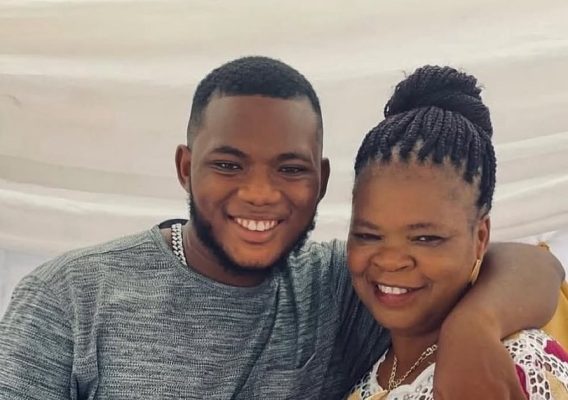The Nigerian film industry, popularly known as Nollywood, is in mourning following news that veteran actress Peju Ogunmola has reportedly lost her only child. This development has sent shockwaves throughout the entertainment community and among her local and international fans, sparking an outpouring of condolences and reflections on the realities faced by families—public and private alike—when confronted with profound loss.
According to reports first shared by fellow actress Biola Adebayo via Instagram on Tuesday, Ogunmola’s bereavement has touched a nerve within the creative community. Adebayo’s somber post, which included symbols of a candle and a broken heart, read, “This is a big loss. This is devastating and heartbreaking. This is tragic. May God Almighty comfort mummy Peju Ogunmola who just lost her only child. May God Almighty be with the family and loved ones at this tough time,” as seen on her verified social media account.
Peju Ogunmola is a respected figure in Nollywood, known for her depth of talent and long-standing contribution to the Yoruba-language sector of Nigerian cinema. She is also part of a notable film family, being married to celebrated actor Sunday Omobolanle (Papa Lolo) and having deep roots within the industry. Her work over the decades has endeared her to audiences not just in Nigeria, but across West Africa and among the African diaspora globally.
As news of the tragedy spread, industry colleagues and fans alike quickly responded, reflecting the sense of communal support that often characterizes Nollywood during difficult times. Actor Femi Adebayo, a leading figure both on- and off-screen, shared a heartfelt message, stating, “Life has written a line too heavy for the stage. Today, we mourn with our dear elder, a thespian whose heart now carries the weight no mother should bear. My thoughts and prayers are with you ma. May Almighty Allah grant him Aljannah Firdaus.” [Source: Femi Adebayo Instagram, June 2024]
Ibrahim Yekini (known popularly as Itele D Icon), another Nollywood star, added his voice to the chorus of condolences, emphasizing the gravity of the loss: “A mother’s pain in losing her child is beyond words. Olorun ma fi Ina Omo Jo Gbogbo Abiamo. Vanity upon vanity,” he wrote, expressing in Yoruba what many parents fear and hope never to experience. According to social media tributes, similar sentiments have been echoed by colleagues and friends from both the entertainment scene and the broader community.
Bukola Adeeyo, also an actress with deep connections in Yoruba Nollywood, described the news as a “rude shock” and stated, “Only God can console you ma. No parent deserves this kind of pain. Ah, Oluwa, have mercy.” [as seen on Instagram, June 2024] Her remarks underline the widespread empathy being expressed, and the sense of collective sorrow within the creative fraternity.
Further weighing in, respected actress Faithia Williams reportedly noted that she only learned of the incident after seeing messages from other colleagues online, another indication of how suddenly and unexpectedly grief can strike, and how interconnected the Nollywood community remains.
The loss also resonates beyond the professional sphere, highlighting enduring cultural and family values in Nigeria and West Africa. In many cultures, children are considered blessings and a primary source of legacy; their loss is especially poignant and is treated with deep communal sensitivity. As is common in Nigerian and African traditions, the community often rallies around bereaved families to offer support, comfort, and prayers—a testament to the country’s strong social fabric.
For fans of Ogunmola and Nollywood more broadly, the event offers an opportunity to reflect on the real lives behind their favorite stars. It also draws attention to the pressures and vulnerabilities entertainers face amid public scrutiny. According to Dr. Olusola Oduyoye, a Lagos-based sociologist, “High-profile bereavements in Nigeria often provoke public discussion on issues of resilience, communal care, and the pressures individuals encounter, even while appearing strong in public.” [Interview, June 2024]
From a broader West African perspective, such moments of grief often transcend borders. Tributes have filtered in not just from Nigeria, but from Ghana and other parts of the continent where Ogunmola is recognized. The event underscores the pan-African bonds that exist through film, art, and storytelling.
Globally, the Nollywood industry is an essential export of modern African culture, providing representation and breaking new ground for African creatives in the diaspora. As such, major events—joyful or sorrowful—rarely stay within borders. International fans have also taken to digital platforms to offer condolences, reflecting the reach and unity forged by African entertainment in the 21st century.
Amid widespread condolences, some voices have called attention to the need for privacy and respect for the grieving family. While social media provides a platform for public empathy, community leaders and mental health advocates—including Nigerian non-profit “She Matters”—emphasize that “families need space to process loss, and we encourage everyone to show kindness and patience during such periods.”
As with many stories involving public figures, there are varying opinions on how such events are reported and discussed. While most support showing solidarity with Ogunmola, some critics advise caution in sharing personal details or speculative commentary out of respect for family privacy. According to media analyst Eyimofe Bamidele, “Balancing public concern with individual dignity remains a challenge in highly-connected societies like Nigeria.” [Source: MediaWatch Nigeria, June 2024]
At this time, the Ogunmola family has not issued a formal public statement regarding the incident, and details remain limited. The Nigerian entertainment media, in keeping with best practices, continue to monitor the situation and encourage respectful dialogue around the topic.
Ogunmola’s contributions to African film and her status as a symbolic mother figure for many in the Nollywood industry mean this moment carries both personal and collective implications. As tributes and prayers continue, the story serves as a reminder of the strength and vulnerability of those who bring art and storytelling to our screens.
How can the Nollywood and wider African entertainment industries best support their members through difficult times such as bereavement—while balancing the public’s desire to show solidarity? Share your thoughts and suggestions below.
Food inquiries: food@nowahalazone.com
General support: support@nowahalazone.com
Story sales/submissions: story@nowahalazone.com
Follow us on Facebook
Follow us on X (Twitter)
Follow us on Instagram










